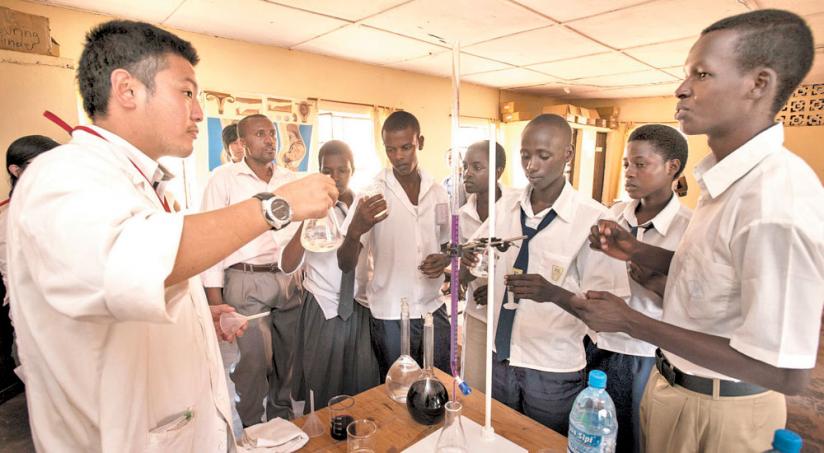Background This year, Japan International Cooperation Agency (JICA) will celebrate the 50 th anniversary since JICA’s Volunteer Program was launched. The program is one of JICA’s principal activities as part of its international cooperation carried out on behalf of the Japanese Government to provide technical assistance abroad at grassroots level.


By Dennis Agaba
Background
This year, Japan International Cooperation Agency (JICA) will celebrate the 50 th anniversary since JICA’s Volunteer Program was launched. The program is one of JICA’s principal activities as part of its international cooperation carried out on behalf of the Japanese Government to provide technical assistance abroad at grassroots level.
Since 1965, more than 46,000 Japanese volunteers have worked in 88 countries of Africa, Middle East, Asia, Oceania, Central America and Latin America. JICA Volunteer Program is a unique program that allows participating volunteers to not only contribute to the development of partner countries but also gain valuable experience in terms of international goodwill, mutual understanding and an expansion in their international perspectives.
The volunteers’ mission is basically to contribute to the socio-economic development as well as to strengthen friendship and mutual understanding between developing countries and Japan.
JICA Volunteers are generally dispatched to public institutions and stay in developing countries for two years, living and working with the people at the ground in the tasks of nation building. Required know- how, knowledge and skills vary depending on requests from countries.
JICA Volunteers spirit is characterized by the will to help others, being highly motivated to pursue the goals and make them happen, being positively integrated into local communities, being modest to learn from others and maintaining a flexible and open mind.
In close coordination with the Government of Rwanda and local authorities, JICA has dispatched more than 200 Japanese dedicated volunteers in many parts of Rwanda since 1987. Currently around 40 volunteers are working mainly in the three fields countrywide.
In Rwanda JICA volunteers are supporting three fields:
In agriculture and rural development: volunteers have supported small cooperatives and business groups to improve their practices such as introducing new products, marketing skills which increase their income thus improve their living conditions.
In water and sanitation management and hygiene promotion: volunteers contributed to operation and maintenance of rural water supply facilities, set up good system of water management as well as promote behavior change towards hygiene practices in the community.
In human resource development: Volunteers in this field work directly with Rwandan teachers and students to share their experience and knowledge. Science and mathematics teachers are based in Primary and Secondary schools to introduce more practical teaching methods, and one of the key activities is to introduce more scientific experiments with local materials into the class. At vocational Schools across Rwanda, JICA volunteers interact with students and teachers providing basic techniques and skills that are the foundation skills used to create or find income generating jobs. Conclusion
"After the Great East Japan Earthquake occurred in 2011, we were heartened by the warm messages and support from all over the world. Those came from people even in developing countries. This reminded us of how expansively and deeply Japan is connected with the world. I believe that such interconnection and the sense of solidarity make the foundation for the development of the international community. I promise that based on our international cooperation expertise and empathy of the people of Japan, we JICA will walk with developing countries as their partner and play the role of strengthening ties between people living there and the people of Japan.”Dr. Akihiko Tanaka, President of JICA states.
****************
Volunteers’ stories:
Bringing change into women’s lives
Friendly, fluent in Kinyarwanda, smiling and hard worker is how we could describe Ms. Yukina Shinohara, the 28 years old lady who work with women cooperatives in Karangazi sector, Nyagatare District since May 2013.
Ms. Shinohara is facilitating agricultural projects. She is mainly helped women to improve their kitchen gardens, start a cooperative of cultivating vegetables as well as start a charcoal project.
Immaculate Mukamana is one of the cooperative leaders that Ms. Yukina supports. She says that since the JICA volunteer came their lives changed. "Ms. Shinohara is the one who provided the knowledge of farming at the first season, she’s given cultivation skills to improve our gardens and even helped us to strengthen the cooperative in some matters such as teaching us to save some money for future needs”, Mukamana speaks.
Ms Shinohara’s target was to bring the women cooperative to a level of ownership where they can run their activities without waiting for outside support. She every day wakes up and goes to work with the women trying to change their mind and telling them that they are able to sustain themselves.
SACCO administration strengthened
"Mr. Morita’s work can be summarized in one word, professionalism. He helped a lot the SACCO administration to become more professional than before” declared Mukakarangwa Francisca, Director of SACCO Coordination Unit at Rwanda Cooperation Agency (RCA).
Mr. Koichi Morita was dispatched to RCA from March 2013 to January 2015 and has worked closely with Saving and Credit Cooperatives (SACCO) headquarters.
His main activities consisted of supporting SACCO Coordination Unit, supporting cooperatives and improving public relations and communication in RCA.
The activities conducted by Mr. Morita were characterized by hard work, creativity and initiatives. "For example He conducted information share workshop among SACCOs in Kigali city to harmonize and standardize policies and procedures. Also he introduced staff ID so we could differentiate staff from clients. Those are some of the things which improved our working conditions a lot”. Mrs Francisca recalls.


